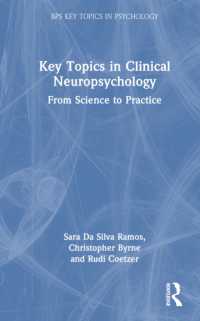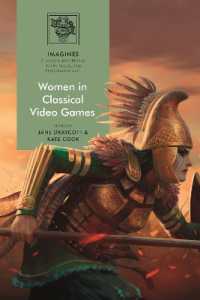- ホーム
- > 洋書
- > 英文書
- > Psychology
Full Description
In this book Jan D. Sinnott synthesizes her 20 years of research on lifespan cognitive development to describe the growth of complex (or 'postformal') thought in adults. She shows specifically how adults improve mentally over a lifetime and learn to think in more complex and wiser ways. Applications of postformal thought are demonstrated in such diverse areas as - family relations - adult education - personal identity - and spirituality. Chapters examine relations between postformal thought and pertinent variables such as age, health, memory, and vocabulary. Other sections deal with issues in humanistic psychology such as - guided imagery - mind - body medicine - and creative intentionality.








